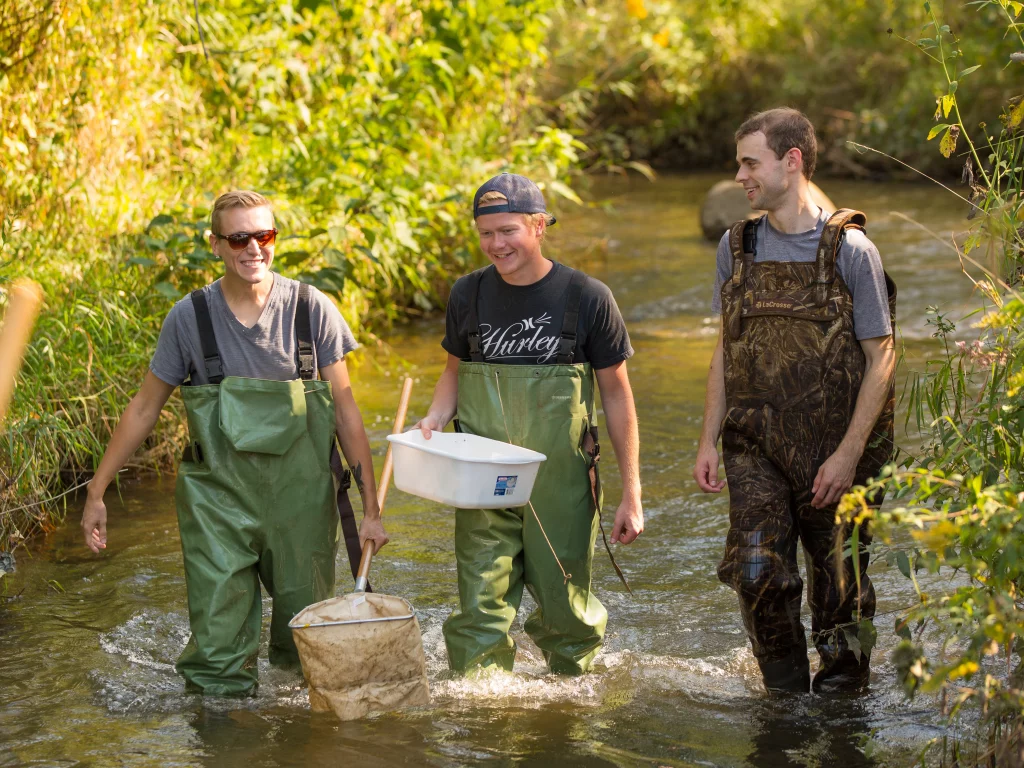Environmental Science

Why Environmental Science at Valpo?
Grounded in science and compassion, we radiate global change. Students with a passion to pave the way toward a brighter, more sustainable future shine in Valpo’s environmental science program. Here, we champion active learning through practice. Our students thrive in living, outdoor laboratories – from protected natural areas to industrial zones. Starting year one, Valpo environmental science students are restoring fish habitats, aiding reforestation efforts, and taking strides toward environmental justice.
Our flexible environmental science program allows students to pursue a complete major in environmental science or a complementary environmental science major. Both pathways equip students with the scientific, humanistic, and social perspectives necessary to preserve and protect earth’s ecosystems.
Environmental Science Highlights
Prime Location
Our environmental science program takes students into real ecosystems across Northwest Indiana, including the Indiana Dunes National Park. Surrounded by agricultural, industrial, natural, and residential areas, Valpo students get a comprehensive view of the roles that pollution, policy-making, and service play in environmental justice.
Real-World Applications
Pushing the boundaries of typical environmental science programs, our students apply what they learn to pressing issues facing our environment, from invasive species management to participation in prescribed burns.
Earthtones
Students pursuing either of our environmental science degrees are welcome to join Earthtones, a student organization dedicated to sharing the key principles of conservation, recycling, and environmentalism with our campus community and beyond.
Environmental Science Major Requirements
In step with Valpo values, the College of Arts and Sciences is committed to empowering students to grow into compassionate servant-leaders. Every student’s Valpo experience begins with an intellectual, emotional, and spiritual journey through our University’s liberal arts core, starting with the Valparaiso University Experience (VUE). This uniquely Valpo perspective gives environmental science students a strong foundation in cultural awareness, communication, and social sciences.
Just as environmental challenges aren’t limited to one area of expertise, our program is designed to pass a truly interdisciplinary perspective on to our students. Our bachelor of science in environmental science draws on the principles of biology, chemistry, environmental engineering, economics, geography, philosophy, psychology, and more, preparing tomorrow’s leaders to always see the larger picture.
Students interested in environmental science can pursue a 52-credit bachelor of science in environmental science or a 32-credit complementary environmental science major to accompany a primary major of choice.
| Environmental Science Core: 30 Credits | ||
|---|---|---|
| GEO 260 | Environmental Conservation | 3 Cr. |
| BIO 171 | Unity of Life | 4 Cr. |
| BIO 172 | Diversity of Life | 4 Cr. |
| CHEM 121 | General Chemistry I | 4 Cr. |
| CHEM 122 | General Chemistry II | 4 Cr. |
| GEO 104 | Intro to Geomorphology in Earth Systems Science | 4 Cr. |
| GEO 215 | Intro to Geographic Info Systems | 4 Cr. |
| One course from the following options: | ||
| BUS 205 | Business Statistics | 3 Cr. |
| GEO 460 | Data Analysis | 3 Cr. OR |
| MET 460 | Data Analysis | 3 Cr. |
| PSY 201 | Statistical Methods | 3 Cr. |
| STAT 140 | General Statistics | 3 Cr. |
| STAT 240 | Statistical Analysis | 3 Cr. |
| Environment and Society Elective: 3 Credits | ||
| One course from the following options: | ||
| Any new or topic course approved by the coordinator of the Environmental Science Administrative Committee | ||
| GEO 265 | Sustainability: Environment, Economy, and Society | 3 Cr. |
| GEO 321 | Urban and Regional Planning | 3 Cr. |
| ECON 210 | Environmental Economics and Policy | 3 Cr. |
| SOC 240 | Food Systems | 3 Cr. |
| Environmental Meanings and Values Elective: 3 Credits | ||
| One course from the following options: | ||
| Any new or topic course approved by the coordinator of the Environmental Science Administrative Committee | ||
| GEO 475 | Culture, Nature, Landscape | 3 Cr. |
| PHIL 230 | Environmental Philosophy and Ethics | 3 Cr. |
| Environmental Science Electives: 14 Credits | ||
| Minimum of 14 credit hours from the following options, including at least one Writing in the Discipline (WID) course (marked with *): | ||
| BIO 215 | Fundamental Microbiology for Engineers | 3 Cr. |
| BIO 350 | Field Biology: Spring | 3 Cr. |
| BIO 430 | Plant Biology | 4 Cr. * |
| BIO 435 | Insect Biology | 4 Cr. * |
| BIO 440 | Ecology | 4 Cr. * |
| CHEM 221 | Organic Chemistry I | 4 Cr. |
| CHEM 222 | Organic Chemistry II | 4 Cr. |
| CHEM 230 | Quantitative Analysis | 4 Cr. |
| CHEM 341 | Environmental Chemistry | 3 Cr. |
| CE 364 | Environmental Engineering I | 4 Cr. * |
| ENVS 290 | Topics in Environmental Science | 1 Cr. |
| ENVS 490 | Advanced Topics in Environmental Science | 1 Cr. |
| GEO 264 | Soils and the Environment | 3 Cr. |
| GEO 266 | River Systems and Landforms | 3 Cr. |
| GEO 304 | Process Geomorphology and Terrain Analysis | 4 Cr. |
| GEO 315 | Environmental Applications of GIS | 3 Cr. |
| GEO 365 | Biogeography | 3 Cr. |
| GEO 385 | Field Study | 1 Cr. (when an environmental field study) |
| GEO 415 | Advanced Geographic Information Systems | 3 Cr. |
| GEO 240 | Introduction to Climate Change | 3 Cr. OR |
| MET 240 | Introduction to Climate Change | 3 Cr. |
| MET 440 | Global Climate Change | 3 Cr. |
| Or any new or topic course approved by the coordinator of the Environmental Science Administrative Committee | ||
| These must include at least 11 hours at a level of 300 or higher. | ||
| Capstone Experience: 2–4 Credits | ||
| ENVS 499 | Colloquium on Environmental Science and Management | 1 Cr. |
| One additional course from the following options: (ENVS 495 and ENVS 499 can be repeated for credit) |
||
| ENVS 381 | Co-Operative Education in Environmental Science | 1 Cr. |
| ENVS 386 | Internship in Environmental Science | 0.5 Cr. |
| ENVS 495 | Independent Research in Environmental Science | 0.5 Cr. |
| ENVS 499 | Colloquium on Environmental Science and Management | 1 Cr. |
Environmental Science Career Outcomes
A degree in environmental science empowers Valpo graduates to lend their light in communities all over the world. According to a 2023 report from the U.S. Bureau of Labor Statistics, the demand for environmental scientists and specialists is projected to grow by 7% through 2033 – with an annual median salary of $78,980.
Careers in Environmental Science:
- Environmental consultant
- Environmental lawyer
- Environmental technician
- Educator
- Geographer
- Marine biologist
- Microbiologist
- Renewable energy researcher
- Sustainability engineer
- Water quality specialist
- Wildlife conservationist

Student Success

